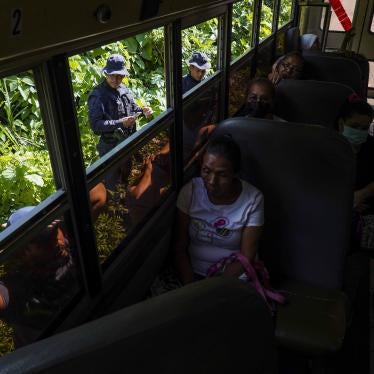President George W. Bush’s new executive order on the Central Intelligence Agency’s detention and interrogation program is contrary to the Geneva Conventions, Human Rights Watch said today.
The new order, issued today, purports to determine that the CIA’s detention and interrogation program “fully complies” with US obligations under Common Article 3 of the Geneva Conventions of 1949 as long as the CIA follows a series of requirements in carrying out the program.
But enforced disappearance – the hallmark of the CIA program, involving secret, incommunicado detention – is itself inconsistent with the requirement under Common Article 3 that detainees be treated humanely. A number of CIA prisoners were held for three or more years in secret detention facilities, known as “black sites,” before being transferred to military custody at Guantanamo Bay in September 2006. Others who were believed to have been held in CIA detention remain “disappeared.”
“By international human rights and humanitarian law standards, the CIA program is illegal to its core,” said Joanne Mariner, terrorism and counterterrorism director at Human Rights Watch. “Although the new executive order bars torture and other abuse, the order still can’t purport to legalize a program that violates basic rights.”
Human Rights Watch also expressed skepticism that the treatment requirements set out in the new order – that detainees not be tortured or ill-treated, and be fed adequately, among others – will be followed. It is well documented that holding detainees in prolonged incommunicado detention, without judicial or other independent oversight, is an invitation to torture and other abuse. Human Rights Watch pointed out that even the International Committee of the Red Cross has not been allowed to visit detainees in CIA custody.
In addition, because the written policies governing the CIA interrogation program will be classified, it will be impossible for any outside monitor to assess whether the interrogation practices they allow are consistent with international standards. Given that then-CIA director Porter Goss once referred to waterboarding – a form of mock drowning – as a “professional interrogation technique,” Human Rights Watch is concerned that abusive methods might still be authorized.
Notably, US officials have still refused to publicly denounce waterboarding as torture.
In criticizing the CIA program, Human Rights Watch continued to draw attention to more than three dozen missing CIA detainees. In June, Human Rights Watch and five other human rights groups published a report listing 39 people who were believed to have been held at some time in CIA prisons, and who remain "disappeared". One of the missing detainees, Muhammad Naeem Noor Khan, recently reappeared in Pakistan.
“Detainees in CIA custody were in many cases ‘disappeared’ for years,” Mariner said. “Several dozen are still ‘disappeared’ with no information about their fate.”
The UN Working Group on Arbitrary Detention has expressed grave concern about the US government’s use of secret CIA prisons to hold suspected terrorists, concluding that detention under such conditions violates the detainees’ basic human rights and is incompatible with international humanitarian law.








